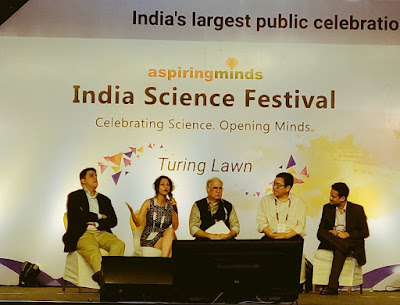Talking to Tech: Keynote at EMERCE Next in Amsterdam
Wonderful experience speaking as one of the few academics in a room full of young tech entrepreneurs at the EMERCE Next event in Amsterdam. I gave a talk based on my new book 'The Next Billion Users' published by Harvard Press earlier this year. I spoke about the myths that aid agencies and tech industries perpetuate about these new user groups based on their biased understandings of them and rooted in little empirical evidence. Worse yet, even in the face of vast evidence that contradicts these worldviews, this thinking still persists so I hope I was able to disrupt a little bit these conventional approaches. I got questions on Article 13 on copyright policies under the new GDPR which indeed is so far from the world of media piracy in developing countries. I emphasized how we need to look also at why these policies are barely enforced based on historical and unfair media business models in the global south. Other questions grappled with the ways the "West" and the "Rest" are the same and yet different and so how can we build tech going forward?
I learnt a lot from this conference that "brings the technology from tomorrow to today" and how "pioneers and experts, innovators and early adopters talk about the success of ML, VR, AI, IoT, AR, Blockchain and Quantum in marketing and business."
1. Academia has a Pessimism Bias while the Tech world has a Hyper-Optimism bias.
2. When asked how do you know you’re "doing good," Jip Samhoud of Samhoud Media said that it’s about writing down your values and knowing in your heart you are making the world better. Clearly academic discussions on Ethics and Tech have NOT made inroads with young tech peeps.
3. A big part of the blame falls on the shoulders of academia. We urgently need to find common ground/ language with the tech world that speaks about "growth hacking" instead of "surveillance capitalism"; that looks at the future through data maximization instead of data justice.
4. Academia and the Tech industry can be mutually beneficial: Scholars work slow and steady; thereby offer critical/ ethical guidelines. Tech peeps move fast and disruptive; thereby they offer insight on customer desires, needs, demands that scholars should give weight to in their theorizing. We can help them be more reflective while they can help us be more empathetic to the market.
5. Learnt that EU H2020 are funding data analytic entrepreneurs who are innovating and solving problems for the car industry (e.g. Media Distillery) on the taxpayers dime. We should use EU money to pioneer solutions to bridge the growing data inequality that corporations would never fund. I start to wonder what the market of venture capitalism looks like and if taxpayers are indeed subsidizing innovation, what kind of shares and benefits do the tax payers receive when these innovations get adopted and monetized by the private sector?
Anyway, was enlightening...




Comments
Post a Comment